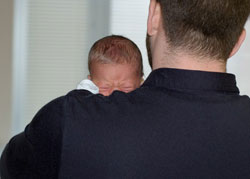Father and Baby: Can a Father
Do Nothing but Wait?
When a baby is newly born, its father can often feel redundant. Indeed, what do we have to offer this frail little
creature that seems to want only maternal care and comforting? Many men equate fatherhood with teaching skills and
imparting values. But communication and interaction seems impossible with an unresponsive infant.
We may feel obliged to wait, and dream of the day when we’ll finally have a chance to impart our experiential
knowledge of work, friendship, peer pressure, dating and intimacy to our young one. After all, we are the
initiators — the ones who help empower our children as they transition from the dreamy somnolence of the womb to
the outer world of responsibility and consequences.

And who knows? Once we’ve got a willful teenager on our hands, who’s exploring strong ideas of independence, we might
long for the days when our own responsibilities amounted to little more than changing diapers, spoon feeding our children
Gerber baby food, and sleeping sporadically.
But is this truly all that the father can do, just wait until his son or daughter is old enough to talk and
accompany him on fishing trips? Often this assumption is made because people don’t consider the subliminal
communications that operate between parents and their children from the moment that they’re born.
It certainly seems like infants don’t care who feeds, changes, and burps them so long as these tasks get done. But they
are more perceptive than we often realize, even at this stage. Their hearing is quite sensitive, and they’re familiar with
the tone of our voices; after a few months, they’ll even recognize the sound of our footsteps. Within four months, perhaps
six, they’ll have grown capable of discriminating between people and expressing their likes and dislikes regarding that
matter. They’ll react differently to negative and positive tones of voice and happy or sad facial expressions.
This suggests that infants are sensitive to these things even before they can show us that they are. So there
is a simple thing that fathers can and should do from the earliest stages of their children’s lives: be present.
Physical contact is very important, also. Many tribal cultures have stressed the importance of touch for an infant,
and our own scientific discoveries have proved that they do indeed suffer without it. I owned a baby carrier that I
could strap right on my back, so that when I went walking somewhere with my son he would be in contact with me the
whole time. This was oftentimes the only way that I could lull him to sleep if Mom was unavailable. I really
believe that I was imparting something of the energies of manhood to my young one when I did this.
Copyright: Seth Mullins
|